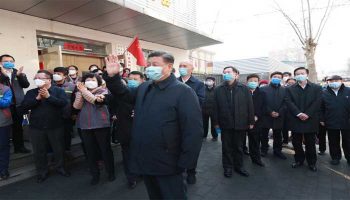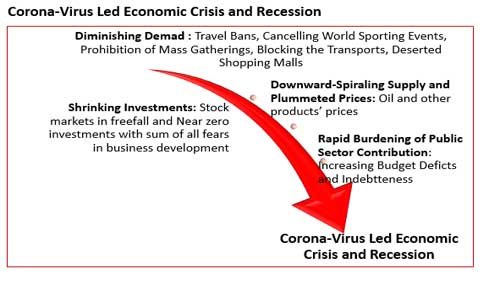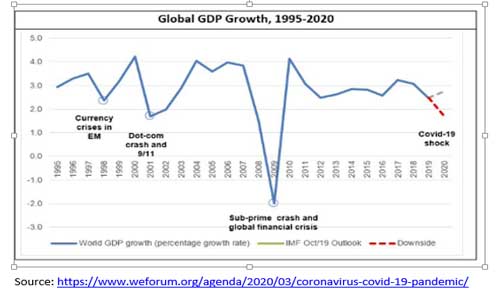Lessons learnt from global best practices to make Sri Lanka more resilient:

“Actions speak louder than words”
By
Prof. DAC Suranga Silva
Department of Economics
University of Colombo
COVID-19 led 2020 Global Recession

What initially seemed us China Wuhan localized health Epidemic, but later it has become a worldwide Pandemic causing to impose with travel bans, cancelling world sporting events, prohibition of mass gatherings, blocking the transports, stock markets in freefall, deserted shopping malls, plummeted oil and other products’ prices, zero investments with sum of all fears in business development . As a result, economic pain of Corona Pandemic will go on for longer and much more severe than first thought.
The Coronavirus disease (COVID-19) is currently having a widespread effect on the global economy. There has been a steep plunge in financial markets and the resulting of growth and income declining, wealth depletion, disruption of global supply chains in manufacturing and retails such as the drop in energy prices and production due to reduced consumption and decreased international trade for investment and intermediate goods, mostly created by China and other dominant countries.

It is obvious fact that the world must prepare for the COVID-19 led 2020 Global Recession. Chetan Ahya, Chief Economist of Morgan Stanley, a World recognized American multinational investment bank and financial services company has clearly indicated “Global recession in 2020 is now our base case”.

As remedial proactive measures, Bank of England expects to cut interest rates to 0.1% – the lowest, they have ever been. The US Federal Reserve already committed to release hundreds of billions of US dollars for steadying the financial markets. It is a clear-cut picture of where the world seems to be going if nothing drastic happens at present.
However, possible global economic recession would not be a “U” or “L” Shaped Recession, but most often it will be “V” Shaped one, similarly happened in Global Financial Crisis-2008.
The global economy can successfully re-strengthen its supply chains through right collaborative effort making by the main players of global economy such as China, U.S.A, India and other European countries.
With globally integrated strategies, more specifically with “3Ts” (Trade, Technology and Training), the world will be able to successfully address the COVID-19 led 2020 Global Recession, otherwise it could be more painful experience for all countries at different degrees and severities.

The full scale and density of the damage of Coronavirus still remains no clear estimation as businesses and consumers are still cutting back on their spending. Analyzing of the stunned business decline on the stock market, subsequent erasing of US $ trillions in investment & capital, following massive drops at all the share markets in the world. Many financial economists are increasingly warning of the multiple and ripple effects triggering a recession near imminent.
United Nations Conference on Trade and Development (UNCTAD) indicated that the coronavirus outbreak could cost the global economy up to $2 trillion this year while requesting to all governments to take urgent steps to reduce the economic cost of this outbreak.
Sri Lanka Needs a Quick Take for Twofold Major Challenges:
As an obvious result of severe failure of Sri Lanka from 2015 to 2019 under Yahapalana Regime, the present government must find effective solutions not only for the negative economic impacts for macroeconomic imbalances, issues and challenges prevailing at present while finding urgent remedial measures for the negative impacts of Corona virus on Sri Lankan Economy.
First Challenge: Correcting the Economic Failures of Yahapalana Regime
More importantly, the effective policy implementation must be provided to enhance local and foreign investments, improve the performance in business sector development, reduce the higher production costs including electricity and other key production inputs, remove the deterrence made from ratchet effect-churning fuel price formula, stop the rapid depreciation of Sri Lankan Rupees, ease the unmanageable trade union and university students’ protests and Increase the efficiency of public services management by eliminating the prevalent severe discouragement and dissatisfaction of government employees. Furthermore, as a result of less attention on national security, Easter Sunday terror attacks have aggravated such issues keeping the country in a severe crisis.
Second Challenge: Needs an Urgent Quick Take for Building the Resilience against the Impact of COVID-19 on Sri Lankan Economy
COVID-19 disaster can bring deep and sudden collapse in economic growth and development of the country if the right policy measures with proper macro-economic direction have not been implemented. Consequently, this economic situation will affect the living standards of poor people of the country. Naturally, real wages will fall sharply and unemployment will rise abruptly. It is the informal daily-based income earners –Informal labourers (working-Poor and Ultra-Poor communities) and SME business sector operators with less income earning must be severely vulnerable except almost all the communities in Sri Lankan economy.
Building the Resilience of Sri Lankan Economy
Managing the disasters like COVID-19 and building the resilience of the economy is vital. Ensuing of resilience against COVID-19 like disasters in our economy does not depend a single skill. It should be the combination of a variety of skills and right coping mechanisms.
The relevant challenges are to be adequately addressed with most suitable structural and implementing agencies and their processes. This should be carried through a Public-Private and People Partnership with multi-level participations. Getting the constructive and continuous contribution of all stakeholders is a must. Clear understanding of the special needs and requirements of the affected and non-effected sectors of the economy due to the impacts of disasters is decisively essential.

Building Resilience of Sri Lankan Economy is the creation of practice of making people & communities and systems better prepared to withstand catastrophic events (both natural and manmade) and able to bounce back more quickly and emerge stronger from these catastrophic shocks for continuation of peoples’ livelihoods and economic prosperity.
Proper result-based planning intervention and implementation of effective policy measures, Enhancing income generation and funding capacity, Establishing of most suitable administration structures, Prioritization of national, provincial and local governments Responsibilities, Proper awareness among key stakeholders including community members are the key decisive factors for creation of “Endurance of Resilience Building” for Disaster Resilient Sri Lankan Economy at present. Proper understanding of Disaster Management Cycle and its stages with the most suitable implementation strategies are necessitated for a great success of Disaster Resilient Sri Lankan Economy
The Effective Measures: “Actions Speak Louder than Words”
As Sri Lanka is currently facing at the stage of disaster occurring due to Corona Virus: COVID-19, it is instrumental to learn the successful best practices implemented for recovering COVID-19 disaster in different countries by at present.
- It has been clearly evidenced that strong state administration is necessary to control and resolve a whole range of issues coming from corona virus disaster to maintain social cohesion and effective implementation of remedial and controlling measures. Implementing strict policies requires firmness of the public administration in the face of criticism from the public and from special interest groups.
- Hong Kong has shown the importance of strong public signals. Early in the crisis, the government closed schools, canceled public events, told all civil servants to work from home, and strongly encouraged private businesses to let their employees do the same. In doing so, the government set a clear baseline on social distancing that appears to have halted community transmission.
- A strong sense of community ensures people take actions to support each other. In all of the countries that have managed to better contain the coronavirus, strong and even draconian actions were taken without significant public outcry. Trust in public institutions and civic services is crucial not just in heading off corona crisis.
- Singapore’s coronavirus strategy has mobilized the city’s comprehensive tracking system to monitor those who have tested positive for Covid-19 and thus also tracking who they came in contact with. The city developed web-based platforms to both share information about the outbreak and ensure compliance amongst those under home quarantine. With these measures, Singapore was able to avoid many of the drastic measures taken in China, Europe, and North America.
- Singapore was one of the first countries to impose restrictions on anyone with recent travel history to China and parts of South Korea. It has a strict hospital and home quarantine schedule for potentially infected patients and is extensively tracing anyone they may have been in contact with. Singapore “will not hesitate to take strong action” against rule breakers.
- Taiwan provides good example for providing free flow of information required for best treatment for the coronavirus outbreak. In addition, Taiwan’s active civil society also plays a critical role in this crisis.Examples,information about stores selling face masks, a Taiwanese software engineer built an online real-time map that can show where masks are stocked in convenience stores and drugstores across the country.
- Coronavirus in South Korea provide us a good example on how to trace, test and treat’ saving lives. In the battle to contain the virus, these labs have become the front line. South Korea has created a network of 96 public and private laboratories to test for coronavirus
Revealing of Great National Superiority by China
- Most outstanding example for the best practices for successful control of the corona virus in the world is the effective strategies implemented by Chinese government. It has been working to tackle the coronavirus outbreak by using multiple measures to contain the spread of the virus as well as information about the outbreak. The government has imposed an extreme quarantine in Wuhan on January 23, which is still in place over a month later. Many cities in Hubei province and elsewhere in China have also implemented lockdowns or restrictions while cases of infection continue toincrease.
- The 3 “A”s (Ambitious, Agile, Aggressive) have been major principles at the implementation of remedial and controlling measures for recovering corona virus disaster.
- In addition, Chinese authorities also built two dedicated hospitals in Wuhan in just over 1 week. Health care workers from all over China were sent to the outbreak’s center.
- Aggressive “social distancing” measures implemented in the entire country included canceling sporting events and shuttering theaters. Schools extended breaks that began in mid-January for the Lunar New Year. Many businesses closed shop. Anyone who went outdoors had to wear a mask.
- Finally we have been proven that deep commitment and collective action have been one of the corner stone for a great success of controlling corona virus disaster in China
Spirited Sri Lanka for Conquering Corona Virus: COVID-19
In parallel to the best practices of other countries, Sri Lanka has also initiated several outstanding endeavors to combat this Corona Virus: COVID-19.
Peoples’ Trust kept on the country’s ever committed Armed Forces and also the image of newly appointed president is one of decisive factors in deciding the success against the Corona Virus: COVID-19 and its disasters. However, the people and civil & professional organizations must come forth with constructive support for the government’s endeavors. Furthermore, despites having the possible difficulties, this is right time to innovate and introduce effective medical practices based on our indigenous medicine and local wisdom for this Corona Virus: COVID-19.
As an emerging nation, we must be proactive and should develop well-focused disaster management and resilience building strategies for future development endeavors of the country, without undermining the possible future disasters like Corona Virus: COVID-19. Finally, instated of trying to implement the unbridled and uncheckedNeo-Liberalized Economic Policies, Home-GrownMost Suitable Development Policies must be designed and to be implemented along with the required priority keeping on Self-Sufficiency Economy like what successfully practices by Thailand and India at present. Finally, we as nation must clearly understand that “Actions Speak Louder Than Words“.






